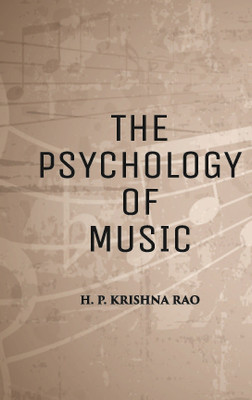THE PSYCHOLOGY OF MUSIC(Paperback, H. P. KRISHNA RAO)
Quick Overview
Product Price Comparison
About the book:-The lecture on ŌĆśThe Psychology of MusicŌĆÖ was written for the All-India Music Conference held at Baroda. When explained in this conference, it evoked in musical circles not a small amount of interest of the novel method adopted in treating the subject of music, a strong desire was expressed to high quarters to arrange for the delivery of the lecture again. In order to meet these pressing demands, it was found necessary to revise the lecture and publish it in book form. Attempt is therefore made in this book to show that every musical note has its own characteristic feeling to express, and that music is but the language of emotion. The Psychology of Music serves as an introduction to an interdisciplinary field in psychology, which focuses on the interpretation of music through mental function. This interpretation leads to the characterization of music through perceiving, remembering, creating, performing, and responding to music. In particular, the book provides an overview of the perception of musical tones by discussing different sound characteristics, like loudness, pitch and timbre, together with interaction between these attributes. It also discusses the effect of computer resources on the psychological study of music through computational modelling. The book can be used as a reference source for perceptual and cognitive psychologists, neuroscientists, and musicians. It can also serve as a textbook for advanced courses in the psychological study of music. The book contains numerous illustrations to make it worth readable. About the Author:-H. P. Krishna Rao (1893ŌĆō1989) was an Indian musician, considered by many as one of the leading vocalists of the Gwalior gharana. He authored several articles and 8 books on music and was the founder of Shankar Gandharva Mahavidyalaya, a music college based in Gwalior. The Government of India awarded him the third highest civilian honour of the Padma Bhushan, in 1973, for his contributions to music. He was also


